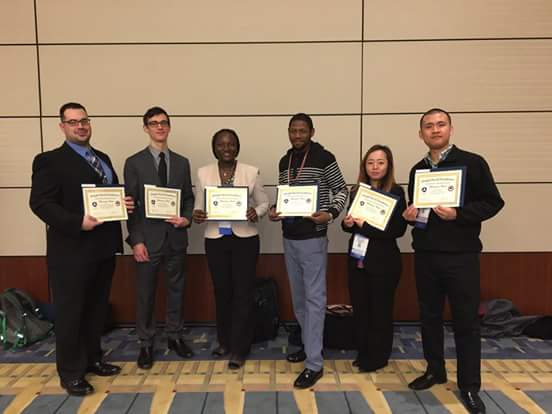$5,000 Fellowship Awarded to CCP Students
From January 10th-13th, the Community College of Philadelphia sent six students to the Transportation Research Board Conference in Washington D.C. The Transportation Research Board convenes professionals from around the globe for a conference to examine and discuss an extensive array of interdisciplinary, multimodal activities to lay the groundwork to combat transportation challenges with innovative solutions. Scholars, scientists, transportation experts, public officials, and other professionals assemble to share, discuss and present ideas while seeking trustworthy, high-quality information and research results to address the transportation challenges of the 21st century. The CCP “Super Six”- Christopher Tremoglie, Bryan Rogers, Latrell Howard, Assetta Seogo, Hye-yun Sohn, and Mark Shao (accompanied by professor Daniel Reed)- were the 2015-2016 recipients of the Dwight D. Eisenhower Transportation Fellowship Award and were the only students selected from colleges within the Philadelphia area to attend the nationwide conference.
As their website states, the Dwight David Eisenhower Transportation Fellowship Program competitively awards fellowships to students who are pursuing transportation-related degrees. Students are awarded at the associate through the advanced academic and professional degree level. The Fellowship Program has eight fellowships categories encompassing all modes of transportation.
It is an annual scholarship up to $15,000 awarded each year from the U.S. Department of Transportation to select students from the Community College of Philadelphia. However, not many students apply to take advantage of this wonderful and exciting opportunity. With a student population totaling close to forty thousand students, less than twenty applied for the fellowship. “At the beginning, I did not think there was enough time to complete all the application requirements in such a short amount of time. I received this fellowship notice at the end of the spring semester last year, yet somehow, I think that pressure made me push myself to finish the whole application on time” said recipient Hye-yun Sohn. As a result of her academic prowess, she was one of six students who received a scholarship, furthered their education and presented their research regarding the future of the country’s transportation needs to public officials and industry leaders over the school’s winter break. “It was definitely worth running around campus preparing all the documents that were needed for me to apply on time” she said. Ms. Sohn is the epitome of the old axiom, “hard work pays off”.
In addition to the monetary scholarship, the overall experience allowed students to grow and expand their horizons and expand their minds that awarded opportunities otherwise not available without their initiative and academic tenacity. As Walter Cottingham once said, “Intelligence without ambition is a bird without wings”.
“The TRB annual meeting was quite an outstanding experience that blew my expectation. Not only the scale of the meeting, but also the quality of information that they shared with us was quite enlightening.” said Sohn. “Overall, I believe that the DDETF program widened my horizons when it comes to my future career goals. On top of that, this is definitely an immeasurable experience and opportunity in my college life.”
The Deputy Secretary of the Department of Transportation, Victor Mendez, was a guest speaker to the recipients of the fellowship from schools around the country. He brought motivational words to for students to follow their passion and when it comes to getting one’s college degree, “Never give up and complete your education”, he said. Mendez also discussed the importance of this conference and the impact that transportation jobs will have in the future of our country with 50% of transportation workers are retiring in 10 years (perfect for students to get jobs, careers, degrees in). There will be a great need for a variety of jobs from IT to engineers, researchers, policy makers. “Opportunity to bridge gap between theory and reality,” Mendez concluded.


